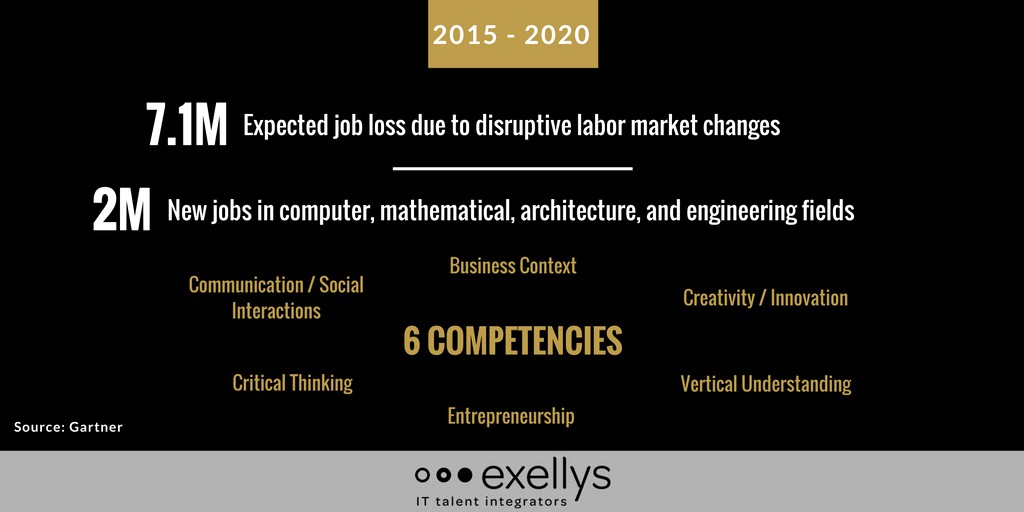Hunting for your first job in IT? Here’s how you start.
on 26 June 2017 for GraduatesFinishing up your studies?
Then you’re probably asking yourself what you want to do.
Maybe you have a concrete idea.
Or maybe not.
In both cases, it’s a good idea to start thinking about what you want to do. In this blog post, we want to give you some key points on how you can find your perfect job in IT.
Finding your perfect job is never easy. But, don’t despair. The good news is that you have your future in your own hands! You’re in the driver’s seat. It’s just a question of finding the right gear and accelerating in the direction of your professional goals.
But how?
Take a moment and check out our blogpost on personal branding. You may think it isn’t any of your concern, but putting your best foot forward in how you’re perceived is a step in the right direction.
The future is in IT.
Here’s even more good news. The need for IT talent is great at the moment, and it will only continue to grow.
Gartner, the reference in the field of research and advice in the IT sector, predicts that by 2020 7.1 million jobs will be lost. On the other hand, jobs requiring knowledge and skills in STEM (Science, Technology, Engineering & Mathematics) will continue to rise.
Now, you’re probably thinking to yourself: I have the right qualifications, I’m safe.
In a sense you will be. You’ll receive job offers more easily.
But is the first job you’re offered the best option for you? Not always.
It takes time and effort to find the IT position that fits you best.
This is why in this post we’re giving you some key tips and stats to help you on the road to finding your perfect IT career.
- Remember that companies don’t hire people: people hire people. This is where soft skills come in. We’ll touch on those a bit later in this post.
- How is your CV? Don’t forget to bring a printed version to the interview!
- Time to check out Penny’s post with 18 interview tips, with ideas on how to prepare and how to thrive in your first job interview after university.
- Let’s go back to personal branding for a moment. How well does your online presence hold up under scrutiny? Those fun Facebook photos of your college days might be nice to have, but might not necessarily show you in the best light as regards getting your first job.
- Are you feeling overwhelmed? Watch our video on how we work to close the gap between academic life and working life. Here we explain the biggest differences between studying and work, and how to overcome them.
Are you a ‘typical’ techie or a business kind of person? Or both?
The chart below shows that the business of the company (what the company does to generate profit) is inextricably linked to the technology that the company uses.
Thus, technology will always have to overcome a change in business. Only in this way will the intended result be achieved.
An important question that you as a school leaver should ask yourself is whether you’d prefer to work on the business-side or the technology-side of a company.
The choice you make here will obviously be greatly influenced by the study program you have taken. For instance, Masters in Business Engineering courses are more on the business side, while Masters in Informatics courses with a very technical background prefer to choose the technology side.
However, one does not necessarily have to exclude the others. There are many courses and careers that combine both business and engineering.
For example, an IT business analyst detects the needs of the business and translates it into IT requirements. Thus, missing functionalities are developed and implemented to address existing business problems.
Learn more about what a business analyst does by reading the story of Lissa and Vincent, IT business analysts at Exellys.
What domain(s) do you like working in?
Your skill set determines which domain you want to work in.
See the graph below to get an idea of the different domains within IT.
But what if you’re interested in more than one domain?
Not a problem!
Dig deeper into IT vacancies, talk to people who are already working in a particular domain.
This way you can judge if a domain is appropriate for you, but of course your skill set will dictate your choice as well.
When we talk about skill set, what do we mean, exactly?
Your skill set is the combination of your technical and soft skills.
But what were the differences between ‘soft’ skills and ‘technical’ skills again?
- Soft skills are the skills of communication, teamwork and collaboration, adaptability, problem solving, leadership, etc.
- Technical skills and knowledge are required to perform specific tasks. For example, the knowledge of a programming language to develop an application is a technical skill, and is something that can be learned at school.
What kind of role and environment do you want to work in?
Maybe you already have some job ‘features’ that are on your shortlist. Things like company culture, packages, whether or not there’s a company car, etc.
It’s good to think about this kind of thing. While the environment is a very important part of the workplace, there’s also the role you take within it.
So let’s take a look at the role you want in your job. Do you want to wear different hats, taking on different roles in your job, or stick to just one?
Would you like to …
- Work in a fixed team with a fixed role, preferably for a longer period?
- Work in the same role for multiple companies?
- Try out different roles in one team?
- Try different roles in different teams and companies?
For example, as a consultant, you will often perform the same role, but always for other customers.
Software developers often work in the same role within a company, with set parameters and expectations.
A project manager, on the other hand, needs to be a communicator, an organizer, an excel wizard, and so on.
And, perhaps most importantly, in what kind of company do you want to fill these roles?
Is the company…
- One that has IT as a core business? For example, HP is a company that derives its sales (exclusively) from providing IT services. Umicore however is in the processing industry and needs IT to support their day-to-day operations.
- A start-up or corporate? And is it big or small? Would you like to be in a less structured environment where you can grow with the company? Then a small startup is interesting. If you need more structure, a (medium) big company is no doubt your thing.
- In possession of a large IT department?
When you have this hammered out, you’ve made your perfect career a bit more real.
Now all that is left is to think about…
Where would you like to work?
Our experience teaches us that about 2/3 of young people seek a job in the region in which they live.
No surprise there.
However, mobility is becoming increasingly important, and companies will also have to respond to this in order to attract and retain the right talent.
The most common measures that companies use, include flexible working hours, the ability to work from home, etc.
Pinpoint how important the place of employment is for you. Are you willing to pass on the perfect job because it is not in the region where you want to work?
You also need to think a bit bigger when it comes to mobility. International work can boost your personal development and career (Forbes):
- Working abroad teaches you to adapt yourself more easily: you are confronted with another way of working, other values, other cultures, etc.
- You will get familiar with or even speak another language.
- Working abroad = building an international network.
What to do now?
- Start from what you want and what you are good at. Scan the internet for interesting jobs, but remember that the first one you find might not necessarily be your best fit.
- Conversely, despite many job offers the ideal job will not, sadly, be offered up to you on a plate. You need to work for it.
- Talk to fellow students, ITs in the domain you want to work in, trusted family members, mentors, etc.
Are you not sure about your place yet? Please do not hesitate to contact me! I’m ready and waiting to help.
Happy job hunting!
Tags: career , job hunt






